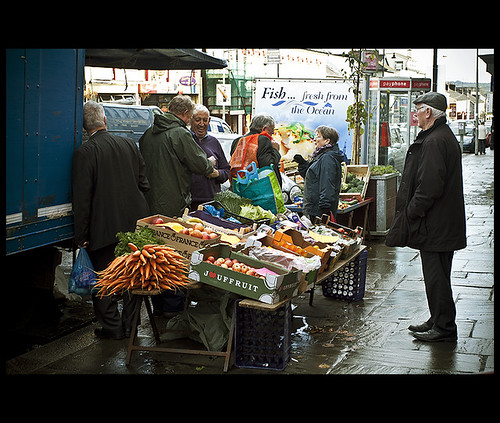

mik morrisey
Craic and Commerce in Roscommon Town
Here’s the answer I needed last Saturday. I bought a parmesan/asagio focaccia at the Winter Market (the chilled and be-scarfed version of the summer Farmer’s Market) and my friend (my ex, to be specific, but a friend all the same), she asked “Can’t you buy that same bread at the local supermarket?” And I admitted that yes, in fact, the South Union Bakery did sell its various breads to local markets. “And isn’t the local market much closer than the Winter Market?” And I admitted that yes, in fact, the local market was closer. “So why don’t you buy the bread there?”
The craic and the commerce — that’s what I should have said. Craic isn’t a familiar term to a lot of folks. It’s an Irish term (well, to be completely accurate, it’s a Gaelicized English term, but dammit the Brits took so much from the Irish over the generations that they’ve no complaint if we borrow and improve on one of their words). It’s pronounced ‘crack’ which gives you some idea just how absurd the Irish can be when they put their mind to it, and it refers to good conversation and news and maybe a bit of gossip. And that’s why it’s better to buy your focaccia at the Farmer’s Market or the Winter Market than at the local market — because the craic is better. People are laughing and chatting and sharing stories at the Winter Market; at the local market they’re all behind counters and busy shelving things and putting new prices on the dish soap. On Saturday I bought a bottle of Greek Basil and Garlic olive oil from a young woman who’d inherited a few acres of farmland from her grand-dad, bless his agricultural soul, where she now makes artisanal infused oils and vinegars. You might be able to buy the oil at the local market too, but you won’t learn the history or see the young woman’s proud smile.
Craic and commerce — they go together like…well, like garlic and basil. Like cheese and bread. Like Laurel and Hardy.
Blog photograph copyrighted to the photographer and used with permission by utata.org. All photographs used on utata.org are stored on flickr.com and are obtained via the flickr API. Text is copyrighted to the author, greg fallis and is used with permission by utata.org. Please see Show and Share Your Work
